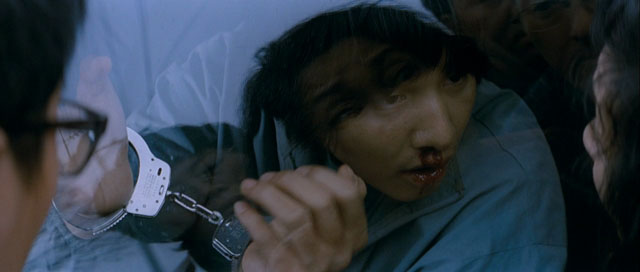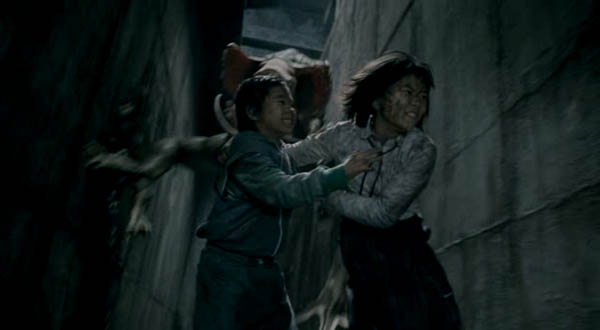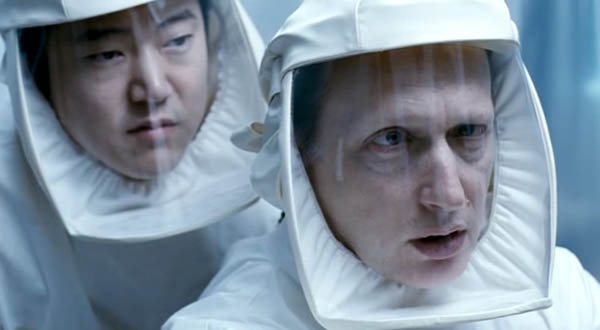Incoherence (1994, Bong Joon-ho)
Bong’s half-hour student short has been on my laptop for ages, and since I’d just watched Coherence, I couldn’t resist pairing these. I’m guessing it’s closer in tone to his unseen Barking Dogs Never Bite than his more sinister features of the 2000’s. Three comic chapters, each featuring a man in a position of power doing something immoral (professor reading porn in his office, business exec stealing milk from stranger’s front step, lawyer getting drunk and belligerent) with an epilogue of the three appearing on a panel show to discuss morality and self-control. The drunk prosecutor would go on to play a detective in Memories of Murder.

Light Is Calling (2004, Bill Morrison)
Like a Decasia outtakes short. Scenes from The Bells (1926, James Young), destroyed and decayed, set to serious violin music. The director of Begotten probably cries himself to sleep watching this.


Three Video Haikus (1994, Chris Marker)
Firstly, some manipulated digital video of a river under a bridge.
Catherine Belkhodja from Level Five smokes a cigarette, each exhale punctuated with superimposition of an owl in flight. I think the smoking is the same footage from Marker’s Silent Movie. These first two were set to piano music.
The third has opening and closing titles, static shot of railroad tracks, and electronic sfx, and I think was supposed to be humorous?



Tomatoes Another Day (1930, James Sibley Watson)
I didn’t know indie goof-off sound shorts existed in 1930. Where’d they get the equipment? Oddball talkie featuring a wife, her husband and her lover playing out a predestined scene while flatly speaking their every thought (“You are my husband”). The second half is full of punny wordplay like the title line, which the Portuguese subtitles on Youtube faithfully translate as “outro dia de tomates”.
This is Watson of Watson & Webber, following up their Fall of the House of Usher. A. Grossman, who brought the movie to my attention with a Bright Lights article, calls it a “satire of the redundancy of talkie cinema, in which image and sound are inflexibly congruent” … “a revelation that the silent trance, when granted sound, becomes embarrassingly demystified.”

On Departure (2012, Eoin Duffy)
The Missing Scarf finally showed up online, so after failing to impress Katy with that, I watched Duffy’s other popular success. Depressed alien goes on a business trip… then, as tends to happen at the end of his movies, the world ends. Actually I read an interview with Duffy, and this is about something else entirely, but I’m gonna gonna stick with my interpretation.

Sausage (2013, Robert Grieves)
Local craft food sellers work together to defeat mustache-twirling corporate foodlike-product manufacturer. Populace is easily distracted by whatever shiny new thing tries to catch their attentions. Movie shows the public swayed by price and spectacle (true) and turning up their noses at gross combinations of things like hotdog-in-a-donut (sadly not true).

Three Little Bops (1957, Friz Freleng)
I’d planned to follow up Shocktober with Animation November but cancelled… still watched a few Looney Tunes, though. Wolf vs. Three Pigs story retold in the jazz age. At the end, the wolf dies, goes to hell, returns as a ghost sitting in with the pigs on trumpet. Could they not get a vocalist who could sing on the beat… or is that jazz? Great line: “The Dew Drop Inn did drop down.”


Duck Soup to Nuts (1944, Friz Freleng)
Porky goes duck hunting. Daffy does his thing, gets away.

Ali Baba Bunny (1957, Chuck Jones)
Bugs and Daffy are buddies on vacation together until Bugs digs ’em into an Arabian treasure cavern and DD gets greedy. Showdown with the Sultan’s enforcer follows. DD gets shrunk by a genie. Stereotypes abound, but this is all better than it sounds.

Transylvania 6-5000 (1963, Chuck Jones)
The one with the two-headed bird-witch. Bugs stays at a vampire’s castle, learns some useful magic words. Remade in the 80’s with Jeff Goldblum and Geena Davis,
Vampire vs. umpire:

Porky in Wackyland (1938, Robert Clampett)
Katy’s first time in Wackyland – she seemed annoyed at just how wacky this was, decried the “darkest africa” bit, asked if that’s what dodos really looked like, and claims scientists are trying to clone new ones.
Boop-Oop-a-Doop (1932, Dave Fleischer)
Less nuts than my favorite Boops can be. A couple terrific visual gags, some good cartoon weirdness (sinister circus ringmaster has a mighty morphing mustache, empty seats applaud on their own) and one song (“don’t take my boop-oop-a-doop away”) but Betty’s act only amounts to whipping lions, and her standard damsel-in-distress scene (saved by Koko the Clown) is uninspiring.

Arcana (2011, Henry Hills)
A half hour of zen based on a “treatment” by John Zorn (a numbered list of things) and featuring his music. I always love Hills’s editing (less extreme here than I’ve seen before), so this is enjoyable and relaxing, with seemingly no rhyme or reason to the order of events. I fell asleep to this a couple times in Georgia but only now watched it all the way through. Katy also praised the movie when I used it once as a kitchen screensaver.




























